Օգս . 27, 2025 02:40 Back to list
T-Shirt Embroidery Machine: Multi-Head, 12 & 15 Needle Models
Industry Trends & The Evolution of Embroidery Technology
The global textile and apparel industry continues to evolve, driven by consumer demand for personalized and high-quality products. In this dynamic landscape, the role of advanced embroidery machinery has become paramount for businesses aiming to maintain a competitive edge. The market for custom apparel and promotional items is experiencing robust growth, propelled by the rise of e-commerce, print-on-demand services, and the increasing trend towards brand personalization.
Key industry trends underscore the demand for versatile, efficient, and precise embroidery solutions. Businesses are increasingly seeking machines that can handle diverse materials and designs with minimal downtime, while also offering scalability. This includes a growing interest in multi head embroidery machine setups for mass production, alongside compact yet powerful single-head units for specialized tasks or smaller businesses.
A central component in this technological advancement is the modern t shirt embroidery machine. These sophisticated systems are designed to meet the rigorous demands of commercial operations, offering a blend of speed, accuracy, and user-friendliness. From small custom shops to large apparel manufacturers, the ability to produce intricate designs on various garments, including t-shirts and hats, is a critical capability. The latest models, such as the 12/15 Needles Computerized Hat T Shirt Embroidery Machine, represent a significant leap forward, providing the flexibility required in today's fast-paced market.
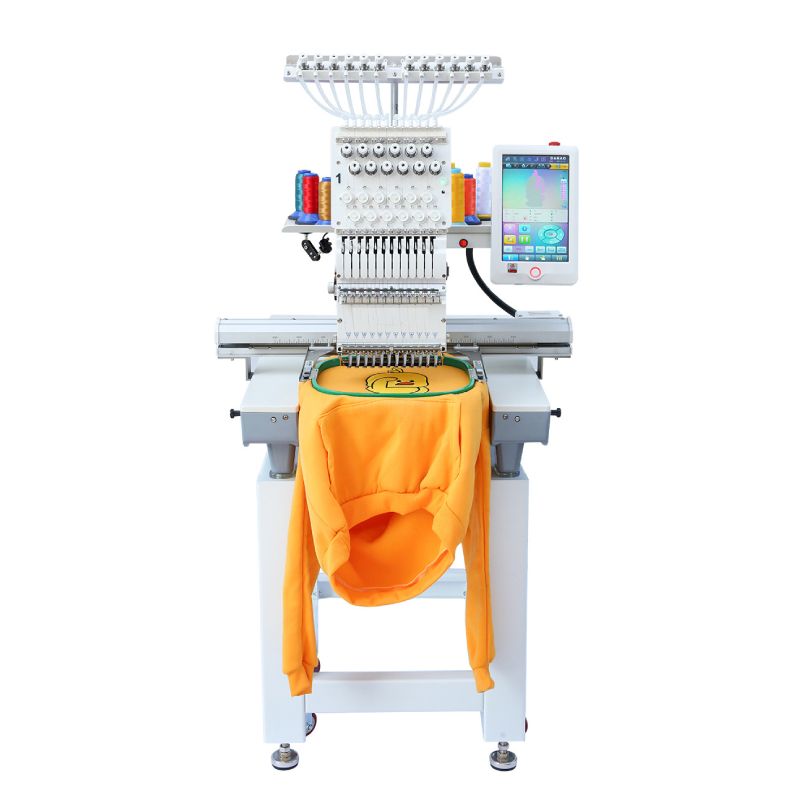
Technical Deep Dive: The Anatomy of a Modern Embroidery Machine
Understanding the intricate engineering behind a state-of-the-art t shirt embroidery machine is crucial for appreciating its capabilities. These machines are complex electro-mechanical systems where precision is paramount. Key components include:
- Needle System: Machines typically feature 12 or 15 needles, each holding a different thread color. A 12 needle embroidery machine offers excellent versatility for most designs, while a 15 needle embroidery machine provides an even broader color palette without manual thread changes, enhancing efficiency for multi-color intricate designs.
- Pantograph/Embroidery Field: This is the moving frame mechanism that holds the hoop and positions the fabric under the needle. Its precision determines the accuracy of the stitch placement and the size of the embroidery area.
- Servo Motors: High-performance servo motors drive the needle bar and pantograph movements, ensuring high speed, quiet operation, and extreme accuracy, crucial for achieving consistent stitch quality even at high RPMs.
- Control System: A sophisticated computer control system, often with an intuitive touch-screen interface, manages design loading, color sequencing, stitch density, and machine diagnostics. This digital brain is what makes computerized embroidery possible.
- Thread Trimming System: Automatic thread trimmers reduce manual labor and improve efficiency by cutting threads between color changes or jumps in the design.
- Hooping Systems: Interchangeable hoops and frames accommodate various garment types, including flat items, caps, and cylindrical objects, demonstrating the machine's versatility.
The synergy of these components allows for the complex synchronization required to produce high-quality embroidery at speeds upwards of 1000 stitches per minute (SPM). Expertise in machine operation and maintenance is critical to leverage these advanced features fully.
Manufacturing Process & Quality Assurance Protocols
The production of a high-performance t shirt embroidery machine adheres to stringent manufacturing protocols to ensure reliability and longevity. The process integrates advanced engineering with meticulous assembly, focusing on critical aspects such as material selection, precision machining, and rigorous testing.
Process Flow Overview:
- Component Sourcing & Material Specification: Utilizing high-grade aerospace-grade aluminum alloys for critical structural components, hardened steel for needle bars and drive shafts, and premium-grade plastics for non-stress components. This ensures optimal balance of strength, lightweight design, and durability.
- Precision CNC Machining: Main frames, pantograph components, and other intricate parts are manufactured using multi-axis CNC machining centers. This process guarantees micron-level tolerances, essential for the smooth and accurate operation of the embroidery head and frame movement.
- Electronics Assembly & Integration: The sophisticated control board, servo motor drivers, and touch-screen interface are assembled in cleanroom environments to prevent contamination. Each electronic module undergoes functional testing before integration.
- Robotic & Manual Assembly: Core mechanical sub-assemblies are often robotically assembled for consistency, followed by skilled manual assembly for complex wiring, sensor calibration, and final integration of the embroidery head.
- Calibration & Initial Testing: Each machine undergoes extensive calibration for needle timing, thread tension, and frame movement. Initial test runs are performed to check for stitch quality, consistency, and operational noise levels.
- Endurance & Stress Testing: Machines are subjected to prolonged endurance tests (e.g., 72-hour continuous operation) under various load conditions to simulate real-world usage. Vibration analysis and thermal imaging are used to detect potential weaknesses.
- Final Quality Control & Certification: A comprehensive final inspection covers all mechanical, electrical, and software functionalities. Adherence to international standards such as ISO 9001 for quality management and CE certification for European market safety is rigorously verified. Machines are also tested for FCC compliance to ensure electromagnetic compatibility.
The typical service life of such a machine, with proper maintenance, is estimated to exceed 10 years, making it a sound long-term investment. These machines are primarily designed for target industries including apparel manufacturing, custom promotional products, fashion design studios, and specialized home-based embroidery businesses. Advantages include high stitch precision, operational efficiency, low vibration, and rapid design changeover capability.
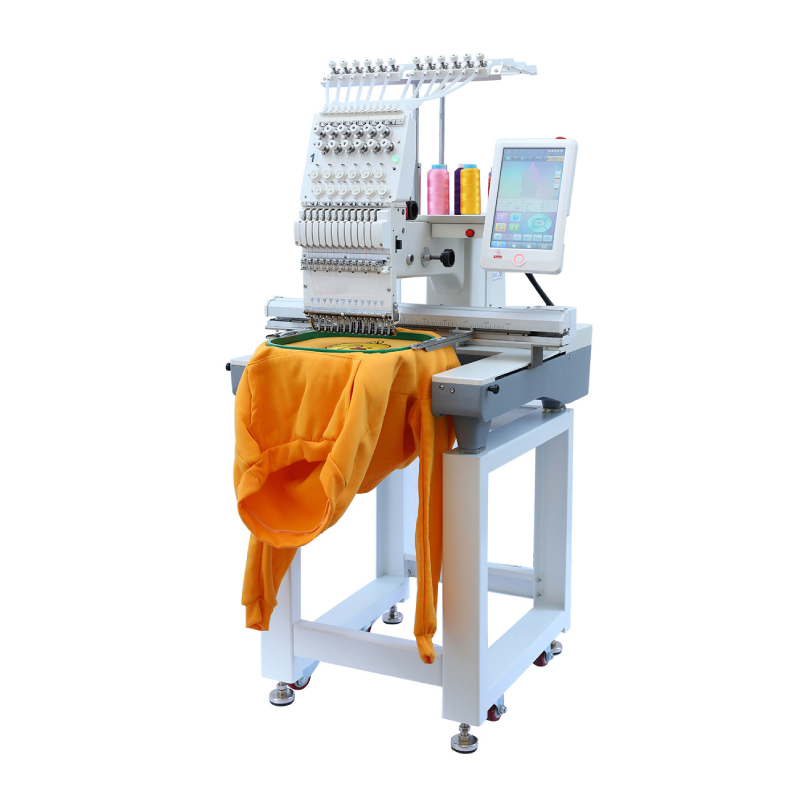
Key Technical Specifications & Performance Parameters
Detailed specifications are crucial for B2B buyers evaluating a t shirt embroidery machine. The 12/15 Needles Computerized Hat T Shirt Embroidery Machine boasts an impressive array of features designed for optimal performance and versatility.
Product Specification Table: 12/15 Needles Computerized Hat T Shirt Embroidery Machine
| Parameter | Specification |
|---|---|
| Needles Available | 12 Needles / 15 Needles (Configurable) |
| Embroidery Area (Flat) | Standard: 360 x 510 mm (14 x 20 inches) |
| Embroidery Area (Cap) | Standard: 80 x 270 mm (3.15 x 10.6 inches) |
| Maximum Speed | 1200 Stitches Per Minute (SPM) for Flat, 1000 SPM for Cap/T-shirt |
| Control System | 7-inch High Definition True Color LCD Touch Screen |
| Memory Capacity | Up to 200 million stitches, 200 designs |
| Supported Formats | DST, DSB, etc. (Industry standard formats) |
| Power Supply | AC100-240V, 50/60Hz, 150W (Energy Efficient) |
| Automatic Functions | Automatic thread trimming, color change, start/stop |
| Connectivity | USB, Network (LAN) |
| Machine Dimensions (LWH) | Approximately 750 x 780 x 1600 mm |
| Machine Weight | Net 180 kg, Gross 250 kg |
These specifications highlight the machine's capacity for high-volume, precision work, making it suitable for both professional and high-end home-based operations. The robust build and advanced control system ensure reliable performance over extended periods.
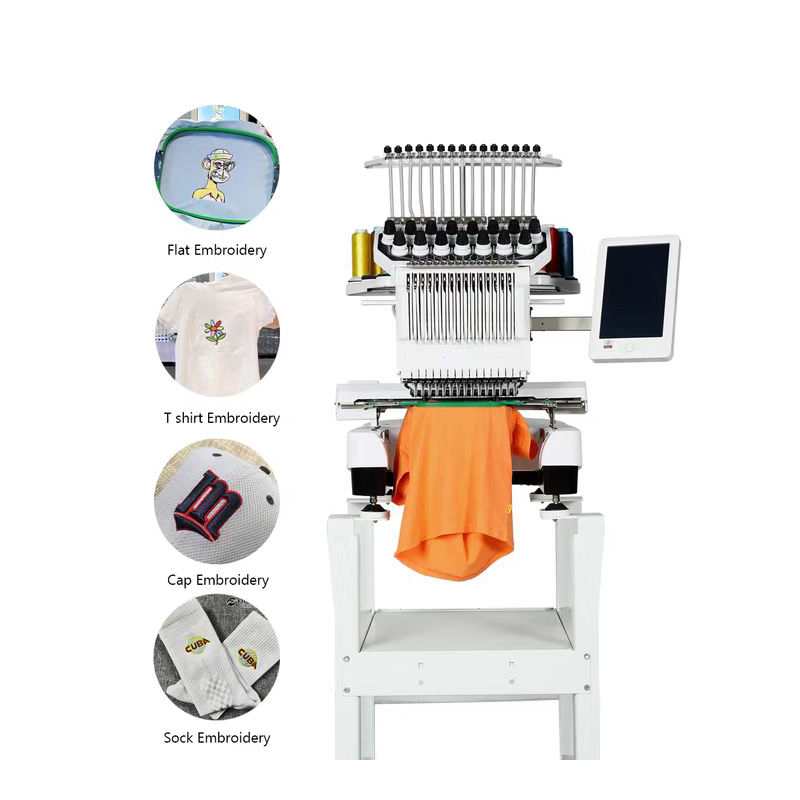
Technical Advantages & Performance Metrics
The advanced design of modern embroidery machines delivers significant technical advantages that translate directly into operational benefits for businesses. These advantages differentiate high-quality equipment from entry-level or older models.
- Superior Stitch Quality and Precision: High-resolution servo motors and precision-engineered pantographs ensure every stitch is perfectly placed, resulting in crisp, clean embroidery. This minimizes common issues like puckering, thread breaks, and misalignments, which are often encountered with less precise machinery.
- Enhanced Speed and Efficiency: With speeds up to 1200 SPM, these machines significantly reduce production times, allowing for higher throughput. Automatic thread trimming and color changes further streamline the process, optimizing operator time and minimizing manual intervention.
- Versatility Across Applications: The ability to easily switch between flat, cap, and cylindrical hooping systems makes a single t shirt embroidery machine incredibly adaptable. This versatility is crucial for businesses serving diverse client needs, from corporate uniforms to personalized fashion accessories.
- Robust Durability and Low Maintenance: Constructed with industrial-grade components and a sturdy frame, these machines are built for continuous commercial use. Their design minimizes wear and tear, leading to extended service intervals and a lower total cost of ownership.
- User-Friendly Operation: The intuitive touch-screen interface simplifies design loading, machine settings adjustments, and real-time monitoring. This reduces the learning curve for operators and increases operational efficiency.
- Energy Efficiency: Modern servo motors and optimized control systems contribute to lower power consumption compared to older models, leading to operational cost savings and a reduced environmental footprint.
While some might seek a cheap 15 needle embroidery machine, it's essential to consider the long-term value. Higher quality machines, like those boasting 12 or 15 needles, offer superior durability, better stitch quality, and higher operational efficiency, which far outweigh the initial cost savings of a cheaper, less robust alternative. Investment in a reliable machine minimizes downtime and ensures consistent, high-quality output, crucial for maintaining customer satisfaction and brand reputation.
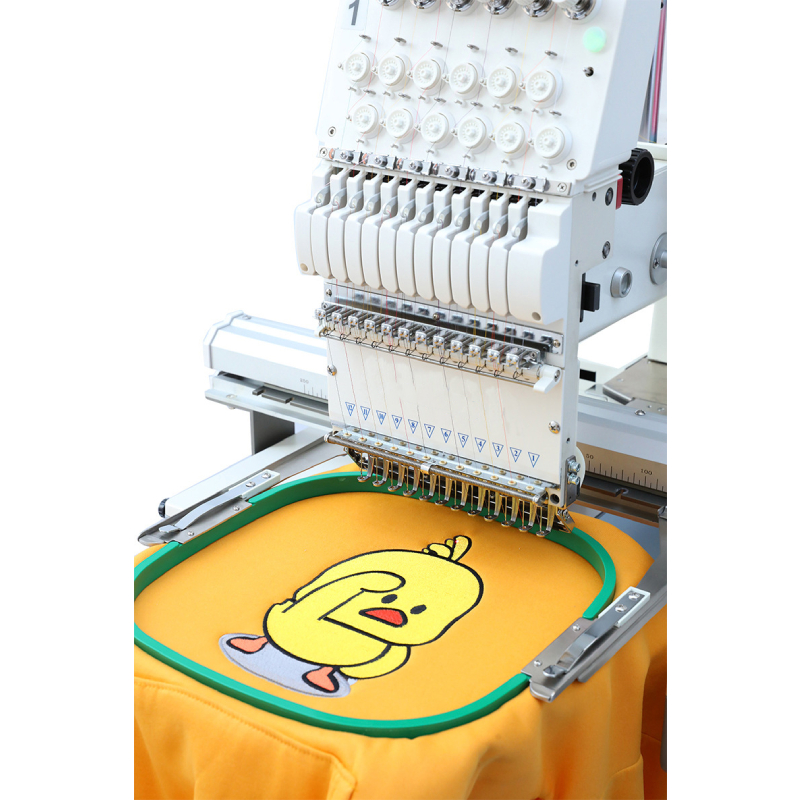
Application Scenarios & Industry Impact
The versatility of a computerized t shirt embroidery machine extends its utility across a broad spectrum of commercial and industrial applications. Its adaptability makes it an invaluable asset for various businesses.
- Custom Apparel and Promotional Products: This is a primary application. Businesses specializing in custom t-shirts, polo shirts, jackets, and hats for corporate branding, team uniforms, events, or personalized gifts heavily rely on these machines. The ability to produce high-quality, durable logos and designs quickly is paramount.
- Fashion and Textile Design Studios: Designers leverage these machines to create intricate embellishments, prototypes, and limited-edition runs for haute couture, ready-to-wear collections, or experimental textile art. The precision of a 12 needle embroidery machine or 15 needle embroidery machine allows for detailed, complex designs.
- Home-Based Embroidery Businesses / E-commerce Fulfillment: Entrepreneurs operating from home or small studios use these machines to fulfill online orders for personalized items. Their compact footprint, combined with industrial capabilities, makes them ideal for scalable growth in the e-commerce sector.
- Sports Teams and Clubs: Customizing jerseys, caps, bags, and other merchandise with team logos, player names, and numbers is a routine application, requiring speed and accuracy.
- Uniform Manufacturers: Companies supplying uniforms to various sectors (hospitality, healthcare, corporate) utilize these machines for branding garments with company logos and employee names.
The impact across these industries is significant, enabling faster turnaround times, higher-quality output, and greater creative freedom, ultimately contributing to increased profitability and customer satisfaction. The seamless integration of software and hardware allows for rapid design iteration and production, addressing the dynamic needs of the modern market.

Vendor Comparison & Market Positioning
Choosing the right vendor for a t shirt embroidery machine involves evaluating several critical factors beyond just the initial purchase price. Businesses must consider aspects such as machine performance, build quality, software capabilities, after-sales support, and the vendor's reputation for reliability.
Comparison Factors for Embroidery Machines:
| Feature/Factor | High-End Single Head (e.g., 12/15 Needles) | Multi-Head Industrial (e.g., Multi Head Embroidery Machine) | Entry-Level/Hobbyist |
|---|---|---|---|
| Number of Needles | 12 or 15 needles | 9 to 15 needles per head | 1 to 6 needles |
| Max Speed (SPM) | 1000 - 1200 | 1000 - 1500 per head | 400 - 800 |
| Embroidery Area | Medium to Large (e.g., 360x510mm) | Very Large (Multi-panel) | Small to Medium |
| Typical Applications | Custom apparel, small runs, caps, home business | Mass production, large uniform orders | Personal projects, very small custom orders |
| Build Quality & Longevity | Industrial-grade components, 10+ years | Heavy-duty, extended lifespan (15+ years) | Consumer-grade, 3-5 years |
| Price Range | Mid to High | Very High | Low to Mid |
| Support & Warranty | Comprehensive, strong vendor support | Dedicated industrial support, on-site service | Basic, often self-service or limited phone support |
Vendors distinguish themselves through innovation in control systems, material handling, and service networks. Established manufacturers often offer robust training programs and extensive spare parts availability, which are critical for minimizing operational downtime. For businesses focused on flexibility and quality without the need for multi-head industrial scale, a high-performance single-head t shirt embroidery machine like the 12/15 needle model provides an optimal balance of features and cost-effectiveness.
Customized Solutions & Scalability Options
Beyond standard configurations, the modern t shirt embroidery machine ecosystem offers numerous avenues for customization and scalability, allowing businesses to tailor solutions precisely to their evolving needs. This flexibility ensures that the investment remains relevant and productive as operational demands shift.
- Specialized Hooping & Clamping Systems: While standard hoops are versatile, custom solutions exist for challenging items like shoes, luggage, or unusually shaped garment panels. This allows businesses to expand their service offerings.
- Software Integration: Advanced machines often support integration with existing design software (e.g., Wilcom, Pulse) and even enterprise resource planning (ERP) systems for seamless workflow management, from order intake to production.
- Automated Feeding and Output Systems: For higher volume, certain models can be integrated with automated fabric feeding and output systems, reducing manual handling and increasing continuous operation.
- Networking Capabilities: Centralized management of multiple machines, including multi head embroidery machine setups, through a local area network (LAN) allows for efficient design distribution and production monitoring from a single control station.
- Upgrade Paths: Reputable vendors provide clear upgrade paths for software and sometimes hardware components, ensuring that machines can be enhanced over time to incorporate new features or improve performance, thus extending their operational lifespan.
For businesses looking to scale, starting with a powerful single-head 15 needle embroidery machine or 12 needle embroidery machine allows for manageable initial investment while providing ample capacity for growth. As demand increases, additional single-head units can be added, or a transition to a multi-head system can be considered, with the foundational knowledge and experience gained from the initial investment.
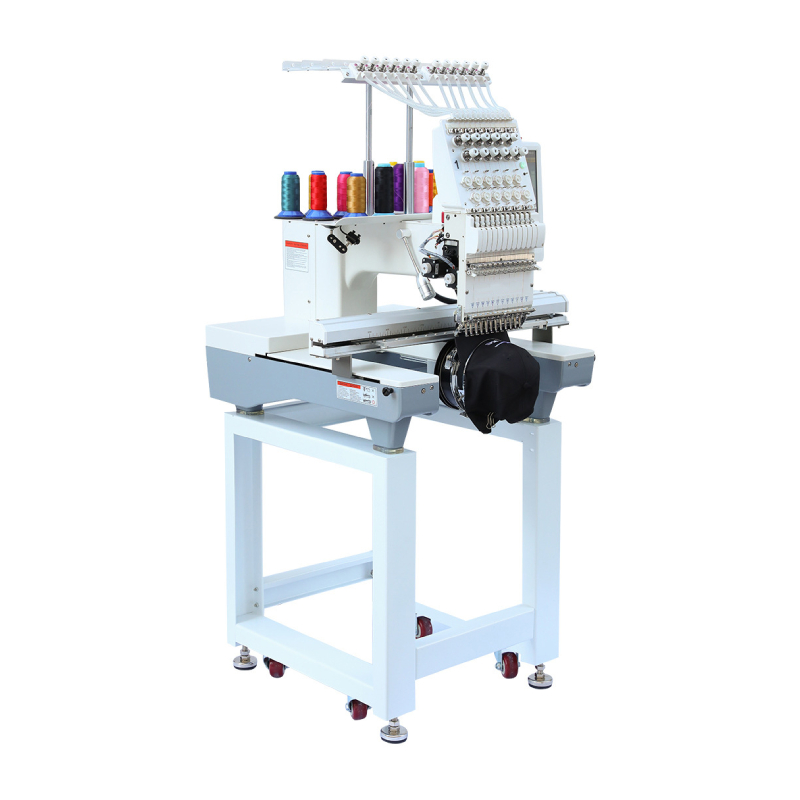
Application Case Studies & Customer Success
Real-world application demonstrates the transformative impact of a reliable t shirt embroidery machine on business operations. These case studies highlight how businesses leverage advanced technology to achieve measurable success.
Case Study 1: "The Rapid Expansion of 'Stitch & Style' Apparel"
Stitch & Style, a burgeoning online custom apparel store, initially struggled with outsourcing their embroidery, leading to inconsistent quality and long lead times. Upon investing in a 15-needle computerized embroidery machine, they were able to bring production in-house. Within six months, they reported a 40% reduction in production costs and a 75% improvement in turnaround time for custom orders. Customer satisfaction ratings soared due to higher quality finishes and faster delivery. The machine's versatility allowed them to expand from just t-shirts to customized hats, hoodies, and bags, significantly broadening their product catalog and market reach.
Case Study 2: "Boosting Local Business with 'Embroider-It-All'"
Embroider-It-All, a small local shop specializing in corporate branding and team uniforms, upgraded from an aging 6-needle machine to a new 12 needle embroidery machine. The immediate benefits included the ability to handle more complex logos with a wider range of colors without manual thread changes, a significant time-saver. Their average production speed increased by 30%, enabling them to take on larger orders from local schools and businesses. The enhanced precision and reliability of the new machine also reduced material waste due to fewer production errors, contributing directly to their bottom line and cementing their reputation as the go-to provider for quality embroidery in their region.
These examples underscore the critical role that advanced embroidery technology plays in enhancing operational efficiency, expanding capabilities, and driving business growth across various scales and markets.
Trustworthiness, Support & Investment Assurance
Investing in a high-value piece of equipment like a t shirt embroidery machine requires assurance of support, reliability, and clear terms. We prioritize transparency and comprehensive customer care to build lasting partnerships.
Frequently Asked Questions (FAQ):
- Q: What is the average lead time for machine delivery?
- A: Standard lead time for the 12/15 Needles Computerized Hat T Shirt Embroidery Machine is typically 10-15 business days from order confirmation, depending on customization requirements and current inventory levels. Expedited shipping options are available upon request.
- Q: What warranty is provided with the machine?
- A: We offer a comprehensive 1-year warranty covering all major mechanical and electrical components. Extended warranty options are available for purchase, providing additional peace of mind.
- Q: What kind of after-sales support can I expect?
- A: Our dedicated customer support team provides technical assistance via phone, email, and video call. We also offer remote diagnostic support and have a network of certified technicians for on-site service if required. Online tutorials and a comprehensive knowledge base are also available.
- Q: Is training included or available?
- A: Basic operational training is typically provided with installation. We also offer advanced training modules, both online and in-person, to ensure your team can fully utilize all machine features and optimize production workflows.
Our commitment extends beyond the sale, ensuring that your investment continues to deliver peak performance and maximum return. We stand by the quality of our products and the expertise of our support team, ensuring that your business has the tools and assistance needed for sustained success.
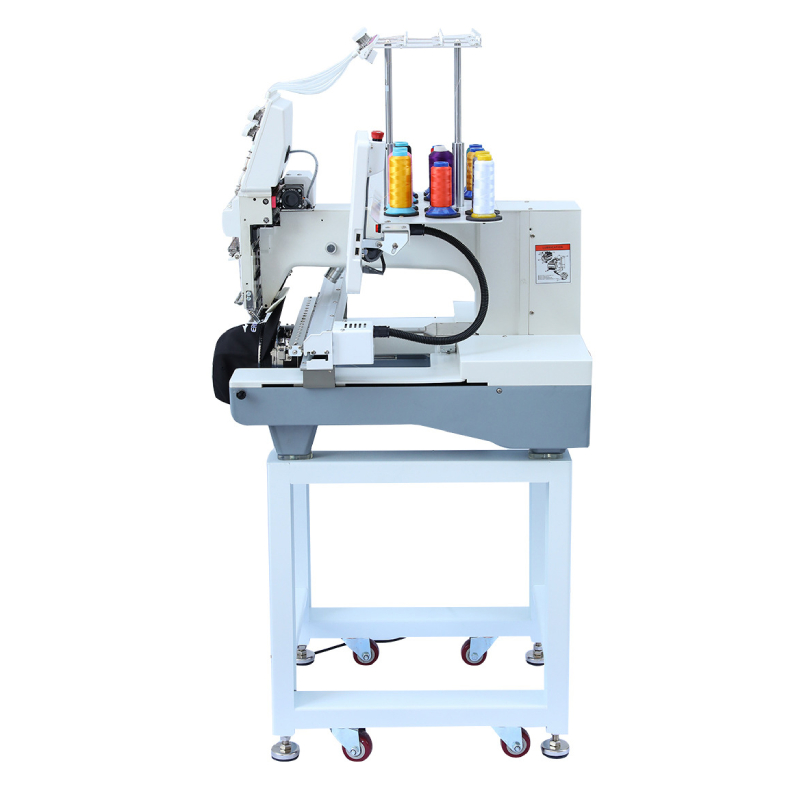
Conclusion
The modern t shirt embroidery machine, exemplified by advanced 12 or 15 needle computerized models, represents a cornerstone technology for the contemporary apparel and custom goods industry. Its unparalleled precision, speed, and versatility are essential for businesses navigating the demands of personalization, rapid turnaround, and consistent quality. By understanding the intricate manufacturing processes, technical specifications, and diverse application scenarios, B2B decision-makers can make informed investments that drive efficiency, expand capabilities, and ensure long-term profitability.
The strategic integration of such technology not only enhances immediate production capacities but also positions businesses for future growth in an increasingly competitive global market. Choosing a reliable vendor that provides robust support and options for customization and scalability further solidifies the value proposition, transforming an expenditure into a strategic asset.
Authoritative References:
- International Organization for Standardization (ISO) - ISO 9001:2015 Quality management systems – Requirements.
- Textile Industry Affairs & Statistics - Global Textile and Apparel Market Size, Share & Industry Trends Analysis Report (various editions).
- Federal Communications Commission (FCC) - Regulations for Electronic Devices (Part 15).
- European Commission - New Approach Directives: CE Marking guidance documents.
-
T-Shirt Embroidery Machine: Multi-Head, 12 & 15 Needle Models
NewsAug.27,2025
-
Professional Embroidery Machines: Precision for T-Shirts & More
NewsAug.26,2025
-
6 Head Embroidery Machine for Professional & Commercial Production
NewsAug.25,2025
-
Computerized T-Shirt Embroidery Machine | Fast, Flat, & Affordable
NewsAug.24,2025
-
Cheap Commercial Embroidery Machine for Sale | Automatic 12-Needle
NewsAug.23,2025
-
Affordable 15 Needle Embroidery Machine for Pro Flat & Auto
NewsAug.22,2025

Copyright © 2025 Xingtai Pufa Trading Co., Ltd All Rights Reserved. Sitemap | Privacy Policy
